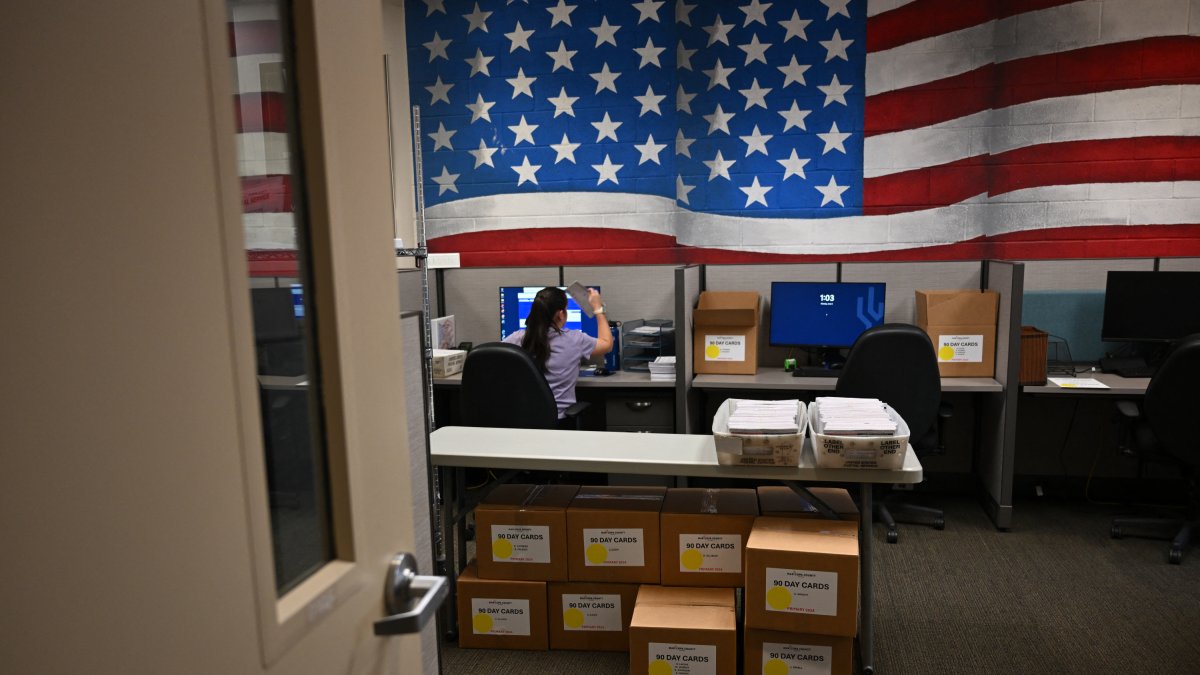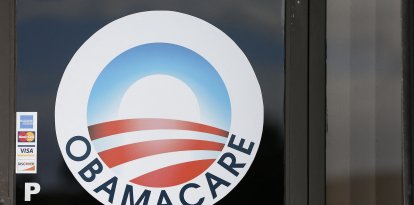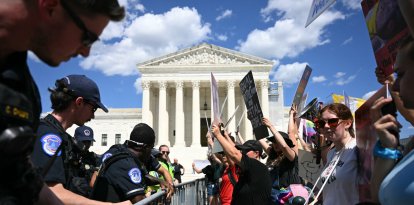Black holes in the US electoral system
Loopholes in the voting system sow doubts about the reliability of the results at the ballot box.

Electoral workers process voter information in Maricopa County, Arizona
With just over a month to go before the election, the world is holding its breath until either Donald Trump or Kamala Harris is officially chosen to occupy the Oval Office. Intelligence agencies claim there have been an increase in the number of cyberattacks from foreign powers, mainly Russia, China and Iran, trying to influence the outcome, as well as the spread of fake news to mislead voters, especially the undecided. However, there are much more immediate dangers that can alter the will of voters: the loopholes in the electoral system.
It first must be noted that there is not a single electoral system, but 50. That is, each state has the ability to organize the voting process as it deems fit with absolute independence from the rest, including voting by mail and early voting, the type of ballots, how the counting is done, the machines and systems, etc.
Mandatory identification
This autonomy covers even aspects as fundamental as whether or not identification is necessary for those who cast their vote, one most hotly contested issues at the moment. For example, in California, practically
anyone can deposit their ballot without anyone checking if they are who they say they are, while in Florida, it is mandatory to present a document that proves it.
As reported by Ballotpedia, "in April 2024, 35 states required voters to present an ID to vote at the polls on Election Day. Of these states, 24 required voters to present a photo ID and 11 accepted other forms of identification. The remaining 15 states did not require voters to present an ID to vote at the polls on Election Day."
With the arrival and release of more than 10 million illegal immigrants into the country under the Biden-Harris administration, this issue has taken on even greater importance for Republican lawmakers, who claim the influx of migrants is part of a Democratic strategy to turn the U.S. into "a one-party country." To that end, they have tried to pass the SAVE act, which seeks to ensure that only U.S. citizens can vote and that it is mandatory to show identification.
Democrats would rather shut down the government than pass the SAVE Act
The Democrats are radically opposed to this proposal, to the point that they have been on the verge of allowing a government shutdown 40 days before the election in order to avoid the House of Representatives vote on the bill, which Speaker Mike Johnson linked to the initiative to avoid the shutdown. Ultimately, it was the speaker who gave his arm to twist.
The majority position against voter ID laws among Democrats at present (an important qualifier, because in 2021, many advocated for the need to create a national voter ID standard) can be summed up in the words of the American Civil Liberties Union (ACLU):
"Overly burdensome photo ID laws deprive many voters of their right to vote, reduce participation, and stand in direct opposition to our country’s trend of including more Americans in the democratic process. Many Americans do not have one of the forms of government-issued photo identification that state laws list as acceptable for voting. These voters are disproportionately low-income, racial and ethnic minorities, the elderly, and people with disabilities. Such voters more frequently cannot afford or cannot obtain the underlying documents that are a prerequisite to obtaining government-issued photo ID card," the ACLU stated.
The Democrats' second excuse is that they claim there is no need to legislate to prevent non-citizen voting, because this is "already illegal" and there are penalties for those who would do so. However, in recent weeks, complaints in this regard have multiplied, and serious failures have been discovered within the electoral system that incorrectly attributed citizenship to noncitizen residents in the voter registry. One of the most notorious cases was in Arizona, where the system incorrectly registered that 98,000 people had submitted proof of citizenship, though they had actually not done so. Even this happened in one of the states where voter identification is mandatory.
'Ballot harvesting'
Another situation that Republicans harshly criticize is the "ballot harvesting," also known as "ballot collecting." It involves voters giving authorization to a person to collect votes of third parties to deposit at the polls. In some states, it is not even required that this person know or have family ties to the voter, and the collecters may be paid for their work.
At present, according to Ballotpedia, "24 states and D.C. allow a person chosen by the voter to return mail-in ballots on his or her behalf in most cases. 15 states specify who could return ballots (i.e., household members, caregivers and/or family members) in most cases." In addition Alabama only explicitly allows a voter to return his or her ballot, and 10 states do not specify whether someone can return someone else's ballot.
Among the main concerns of this rule is identity theft, facilitating people to vote in the names of others who have not done so, or organized groups that seek out vulnerable voters whom they convince to cast their ballot and allow them to turn it in on their behalf. In 2020, Illinois Rep. Rodney Davis noted that "there is a tremendous chain-of-custody problem that should be of concern to all voters. The chain of custody that needs to be taken into account because our ballot is much more important - we need to understand how it gets to its final counting location." Davis introduced legislation to ban this practice.
How secure are ballot drop boxes?
Related to the above are absentee ballot drop boxes. Despite the fact that, in theory, votes are deposited "in sealed and signed envelopes" and that "mailboxes can be monitored or unmonitored and have security devices, such as cameras," there are more and more doubts about their security. State courts are deciding whether or not they fit within the legislation of each state.
At the moment, according to the left-leaning organization Movement Advancement Project (MAP), 30 states establish that these mailboxes are mandatory or that they are allowed throughout the state and must be accessible. In five others, despite being mandatory or permitted, their number is subject to limitations and restrictions. In addition, four states and Washington, D.C., have no applicable law or policy. Finally, they are not used or are prohibited in 11 others.
Security of voter data in question
Another questionable aspect is the security of voter data. Candidates vying for elected office, and even any citizen for a fee, can access the data of registered voters and their voting history. From there, data can be obtained on their voting habits, whether they are regular voters in all types of elections, whether they go to the polls in state, local or presidential elections, and the direction of their vote. This information facilitates fraud through impersonation, especially in states where no identification is required to cast the ballot.
A recurring theme in recent elections has been problems with counting machines. Arizona and Maricopa County have become particularly notorious in recent elections for this type of problem, which has led to allegations of fraud and longer validation times. Although states such as Georgia have announced that the counting of millions of votes for the presidential election will be done manually, the truth is that it is a task in which, given the number and variety of issues included on the ballot (which vary by state and even county), is very difficult to perform without mechanical assistance.
The most radical wing of the left criticizes the electoral system itself and calls for the elimination of the Electoral College. There have been increasingly intense demands after the Republican victories in 2000 and 2016 despite the fact that the Democrat candidate earned a greater number of total votes in each case.

























